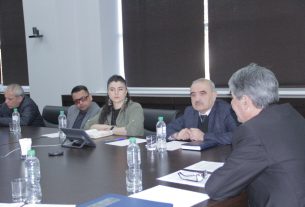Internet culture is one of the effective tools in the fight against extremism and terrorism
 Internet culture (digital culture) is a relatively new term in scientific literature. This term emerged when new forms of culture and their integration into our lives appeared on the global Internet network. The combination of these forms represents Internet culture. So far, the concept of Internet usage culture has been more commonly applied. The culture of Internet usage is a part of Internet culture.
Internet culture (digital culture) is a relatively new term in scientific literature. This term emerged when new forms of culture and their integration into our lives appeared on the global Internet network. The combination of these forms represents Internet culture. So far, the concept of Internet usage culture has been more commonly applied. The culture of Internet usage is a part of Internet culture.
Due to the rapid and intense rise in the popularity of the Internet, the continuous growth of its users, and its influence on all aspects of human life and societies, a proper understanding of Internet culture is becoming increasingly important. Today, Internet culture encompasses many aspects, such as politics, social issues, economics, law, and psychology. In all cases, proper and appropriate use of the Internet can be beneficial for individuals, societies, and states.
Next, we will explain the various aspects of Internet culture for community users and outline the responsibility of the Communications Service in strengthening each aspect of Internet culture. In this text, we will address one of the negative phenomena that has increasingly harmful consequences due to the popularity of the Internet. The emergence of the Internet as the most modern means of mass communication and information dissemination has intensified information wars, and interested parties use it as a tool to achieve their goals. These goals can vary, but unfortunately, in most cases, they are extremely destructive, inhumane, and anti-human.
Particularly important is the issue of the Internet becoming a tool for propaganda and brainwashing by extremist and terrorist groups. This represents a serious threat to human society, and its impact is already deeply felt in our society. Therefore, all users of the Tajik segment of the Internet are respectfully urged to approach this issue consciously when using online resources. Law enforcement agencies in the country have compiled a list of websites and pages that promote terrorist ideologies. This list has been published repeatedly in the media, but citizens should not forget that it is not exhaustive, as the number of such destructive pages is rapidly increasing.
Although the Communications Service also strives to limit access to prohibited and destructive pages within the country as part of its jurisdiction, accounts and pages on social networks can only be closed by the administrators of those social networks. On the other hand, the number of websites and pages with extremist and terrorist content is growing daily. All of this indicates that a targeted flow of biased information, aimed against our national interests, is being purposefully disseminated.
Therefore, users need to be cautious when interacting with the Internet, avoiding copying, spreading, and responding to any online materials. In this case, we need to possess an understanding of the technical nuances of the Internet as well as a high level of political and legal awareness. Deliberate or accidental access to prohibited pages on the Internet can have legal consequences, as ignorance of the law does not exempt one from responsibility. Additionally, we have a responsibility not only to protect ourselves from the negative consequences of the Internet but also to actively combat these shameful and destructive phenomena to reduce the spread of this “infection” in society. In this way, we contribute to the enhancement of the Internet culture in our community.


